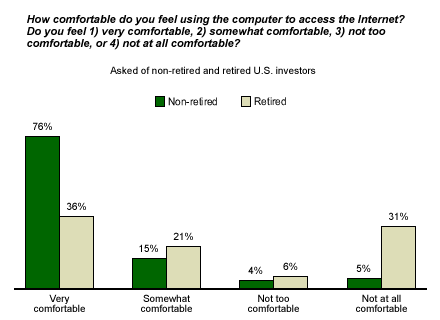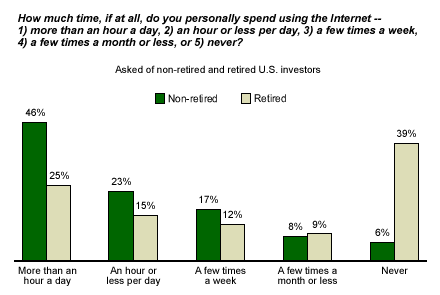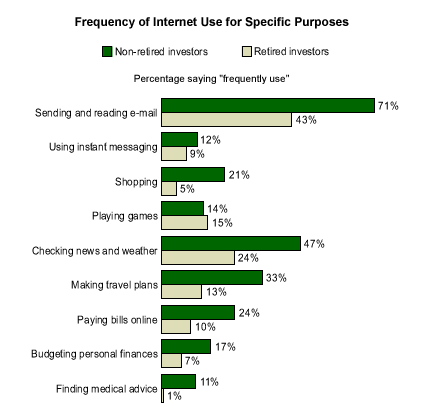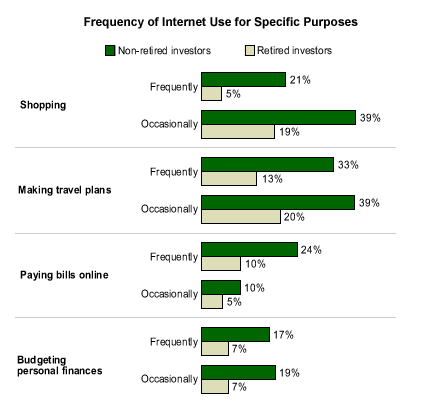The estimate for seasonally adjusted retail e-commerce sales for the third quarter of 2004 stood at $17.6 billion, up 21.5% from the third quarter of 2003, according to the U.S. Department of Commerce. There seems to be no looking back for e-tailers, as analysts predict rapid growth for this sector over the next decade. Judging by the patterns of Internet use -- particularly online shopping habits -- among retired and non-retired investors, that prediction may come true. Future retirees will not only have the financial resources and leisure time to shop online, they'll be more Internet savvy than current retirees and more comfortable with e-commerce.
A recently released UBS/Â鶹´«Ã½AV retirement study* looked at how investors (both retired and non-retired) use the Internet and for what purposes. It's not surprising that retired investors are less comfortable using the Internet than are their non-retired counterparts because older Americans tend to be less computer literate than younger Americans. The contrast between the two groups is extreme -- while 91% of non-retired investors are "very comfortable" or at least "somewhat comfortable" using the Internet, the comparable percentage of retired investors is just 57%. One in every three retired investors (37%) is "not too comfortable" or "not at all comfortable" using the Internet, compared with only 9% of non-retired investors.

Non-retired investors are far heavier users of the Internet than are retired investors. Non-retirees are twice as likely as retirees to spend more than an hour each day using the Internet -- 46% compared with 25%. Thirty-nine percent of retirees say they "never" use the Internet.

The survey asked non-retired and retired investors how often they use the Internet for various activities. Seventy-one percent of non-retired investors and 43% of retired investors say they frequently use e-mail. Forty-seven percent of non-retired investors and 24% of retired investors say they frequently use the Internet to check the news and weather. When it comes to accessing medical advice, 11% of non-retirees turn to the Internet, as do 1% of retirees. The only activity for which retired investors use the Internet as often as those in the non-retired group is playing online games -- 15% of retirees say they frequently go online to play games; 14% of non-retirees do so.

When it comes to using the Internet for e-commerce, the gulf between non-retired and retired investors is wide. While 21% of non-retired investors shop online frequently, only 5% of retired investors shop online this often. This same pattern also plays out for using the Internet to make travel plans, pay bills, or perform budgeting and personal finance activities.

Bottom Line
Change is on the way. Non-retired investors, the next generation of more affluent retirees, are far more Internet savvy than today's retirees. The results of this survey confirm that the next wave of retirees will use the Internet for much more than just e-mail, offering online retailers much to look forward to.
*The special retirement survey is based on a telephone survey of a nationally representative sample of 612 investors who are not retired and of 412 investors who are retired. To be classified as an investor, one must have a minimum of $10,000 in investable assets. All interviewing was completed between July 29-Aug. 1, 2004. For results based on the sample of non-retired investors, the margin of error is ± 4 percentage points at the 95% confidence level. For results based on the sample of retired investors, the margin of error is ±5 percentage points at the 95% confidence level.
